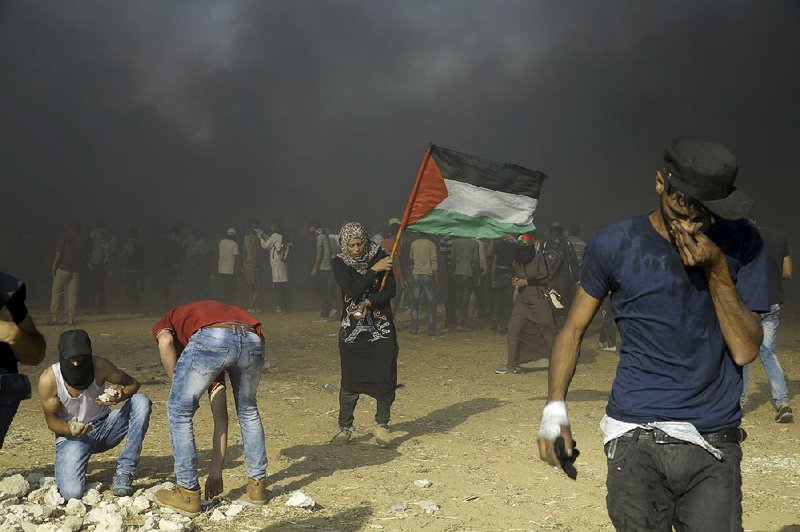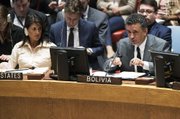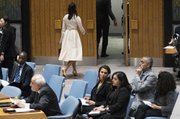The U.S. ambassador to the United Nations said Tuesday that Israel had reacted with restraint in its military response to protesters at the Gaza border and dismissed suggestions that the violence was caused by the opening of the U.S. Embassy in Jerusalem.
Nikki Haley told the Security Council that Hamas, backed by Iran, had incited the violence by urging protesters over loudspeakers to burst through the fence separating the borders and flying kites into Israel with Molotov cocktails attached.
"I ask my colleagues here in the Security Council: Who among us would accept this type of activity on your border?" Haley said. "No one would. No country in this chamber would act with more restraint than Israel has."
The emergency meeting of the Security Council was called by Kuwait to discuss the unrest at Israel's border with Gaza that has killed at least 59 Palestinians and left thousands wounded after Israeli soldiers and snipers fired into a surging crowd of demonstrators Monday. It was the deadliest day for Gaza in years and occurred during celebrations of a U.S. mission in Jerusalem being officially converted into an embassy.
Palestinians object to the move, as they seek Israeli-annexed east Jerusalem as a future capital.
The debate underscored the gulf between the United States and Israel on one side and most other countries on the other in their assessments of six weeks of escalating tensions at the Gaza border about 40 miles from Jerusalem.
From U.S. allies to adversaries, most ambassadors added their opposition to the U.S. Embassy move to their remarks on the violence.
"The unilateral decision by the United States to move its embassy to Jerusalem does nothing but inflame spirits," said Sacha Llorenti, Bolivia's envoy. "The United States, which supports the occupying power, has become an obstacle to peace. It has become part of the problem, not part of the solution."
Karen Pierce, the British ambassador, expressed support for an investigation into Monday's killings, then stated London's position on the U.S. Embassy's opening.
"Our position on the status of Jerusalem and moving the American embassy is well known," she said. "The status of Jerusalem should be determined in a negotiated settlement between Israel and Palestinians, and Jerusalem should ultimately be the shared capital of the Israeli and Palestinian states."
The envoys from China, Sweden and the Netherlands also went out of their way to reiterate their government's position that Jerusalem's status should be left to negotiations and their intention to keep their embassies in Tel Aviv.
Riyad Mansour, the Palestinian representative at the United Nations, said the embassy opening had violated international law and Security Council resolutions.
"No one has the right to imperil our territory and place an embassy in a territory under occupation," he said.
Haley, speaking at the beginning of the session, said the location of the U.S. Embassy has no bearing on whatever Israelis and Palestinians might negotiate and described the opening of the facility as "a cause for celebration."
"It reflects the will of the American people," she said. "It reflects our sovereign right to decide the location of our embassy. Importantly, moving our embassy to Jerusalem also reflects the reality that Jerusalem is the capital of Israel.... Recognizing this reality makes real peace more achievable, not less."
Washington and Jerusalem have blamed the violence squarely on the Hamas militants. The White House has refrained from calling for Israel to exercise restraint, and it characterized the use of live ammunition on the protesters as an act of self-defense.
Hamas nonetheless dialed back the protests Tuesday, and the mosque loudspeakers that had urged Gazans to protest Monday were largely silent. In Gaza City, the biggest protest area Monday, only a few hundred protesters moved close to the border fence.
Shortly before sunset, Hamas leader Ismail Haniyeh appeared and was thronged with supporters.
"We don't want peaceful protests, we want rockets fired," they chanted. "Revenge, Revenge!"
Haniyeh smiled and clenched his fists in the air, but was vague about the group's next step.
"We will continue with the protests, and it is the Palestinian people who will decide the situation on the ground," he said.
Speaking separately, his nephew, Muhammad Haniyeh, also a Hamas leader, said Hamas was satisfied with the surge of international sympathy for Gazans that the protests elicited. But he warned that Hamas could easily return to violence if that sympathy did not convert into the easing of a blockade imposed by Israel and Egypt after Hamas seized control of Gaza in 2007.
"We cannot be patient for much longer after all these deaths," he said of the continuing blockade, a key emphasis of the protests. "If the world does not intervene, I do not think that Hamas can remain silent -- and our armed resistance will respond."
For now, he said, the protests will continue every Friday.
HOSPITALS INUNDATED
Patients with gunshot wounds filled wards and hallways in the Palestinian territory's underequipped and overwhelmed main hospital Tuesday, with dozens of people still waiting in line for surgery a day after violence broke out on the border.
Even before the latest round of bloodshed, Gaza's health system of 13 public hospitals and 14 clinics run by nongovernmental organizations had buckled under persistent blockade-linked shortages of medicines and surgical supplies. At Shifa Hospital in Gaza City, the main health facility in the strip, those woes were magnified this week.
Anticipating an influx of casualties ahead of Monday's mass march, Shifa Hospital had set up an outdoor triage station in its courtyard under a green and blue tarp, setting up 30 beds and stretchers there.
Throughout the day Monday, the hospital received about 500 injured people, more than 90 percent with gunshot wounds, said hospital director Ayman Sahbani. Of those, 192 needed surgery, including 120 who needed orthopedic surgery, he said.
By midafternoon Tuesday, overwhelmed surgeons working in 12 operating theaters had performed only 40 orthopedic operations, with 80 others still waiting their turn.
In the orthopedics department, nerves were frayed Tuesday as relatives worried about wounded family members.
In one room, Ibrahim Ruhmi rested on a bed with bandages on both legs. He had been shot in the right leg, and shrapnel hit his left leg. Outside the room his mother was crying on a chair in the hallway, consoled by his 28-year-old sister, Faten.
Suddenly, the young woman started shouting at nurses in a burst of frustration.
"His leg will rot," she yelled. "What are you waiting for? Do you wait for it to rot so you can amputate it?"
Nickolay Mladenov, the special U.N. envoy to the region, told the Security Council on Tuesday that hospitals in Gaza were "reporting an unfolding crisis of essential medical supplies, drugs and equipment needed to treat the injured."
"There is no justification for the killing, there is no excuse," Mladenov added, going on to say that Israel had a responsibility to calibrate its use of force. At the same time, he said, "messages by Hamas indicate the intention to use mass protests to infiltrate into Israel and attack Israelis."
All of the ambassadors agreed Tuesday that Israel bears a responsibility to keep its response proportionate and not use live ammunition on civilians. "Lethal force should be exercised with restraint," said Olof Skoog, Sweden's representative.
Mansour al-Otaibi, the Kuwaiti ambassador to the United Nations, said he would circulate another draft resolution today calling for the United Nations to provide protection for civilians in Gaza. He said it would be short of a peacekeeping force, however.
A U.N. human-rights official Tuesday called for an independent investigation of more than 100 deaths and thousands of injuries since March 30.
"We urge maximum restraint. ... Enough is enough," Rupert Colville, spokesman for the U.N. Office of the High Commissioner for Human Rights, told reporters in Geneva. Colville said lethal force should be "a measure of last -- not first -- resort."
Other U.N. ambassadors, including China's, echoed the calls for an independent probe.
"The death toll alone warrants such a comprehensive inquiry," Pierce said.
Information for this article was contributed by Carol Morello of The Washington Post; by Fares Akram, Karin Laub, Mohammed Daraghmeh, Tia Goldenberg, Ian Deitch, Josef Federman, Jennifer Peltz and Josh Lederman of The Associated Press; and by staff members of The New York Times.
A Section on 05/16/2018


